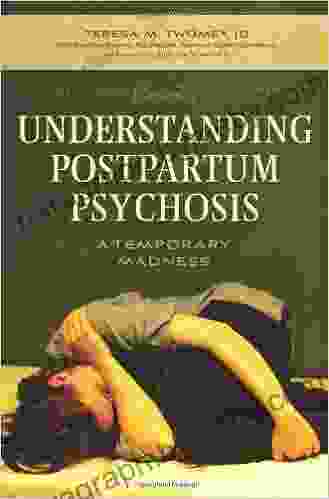Understanding Postpartum Psychosis: Temporary Madness Unraveled

Postpartum psychosis is a rare but serious mental illness that can affect new mothers. It is a temporary condition that usually develops within the first few weeks after giving birth. Postpartum psychosis is characterized by a range of symptoms, including hallucinations, delusions, disorganized thinking, and mood swings.
The exact cause of postpartum psychosis is unknown, but it is thought to be triggered by a combination of hormonal changes, sleep deprivation, and stress. Postpartum psychosis is a medical emergency and requires immediate treatment.
The symptoms of postpartum psychosis can vary from person to person. Some of the most common symptoms include:
4.6 out of 5
| Language | : | English |
| File size | : | 1503 KB |
| Text-to-Speech | : | Enabled |
| Screen Reader | : | Supported |
| Word Wise | : | Enabled |
| Print length | : | 173 pages |
- Hallucinations (seeing, hearing, or feeling things that are not there)
- Delusions (fixed, false beliefs that cannot be changed by evidence)
- Disorganized thinking (difficulty speaking or writing clearly)
- Mood swings (rapid changes in mood from extreme happiness to extreme sadness)
- Anxiety and panic attacks
- Insomnia
- Fatigue
- Confusion
- Loss of appetite
- Weight loss
- Racing thoughts
- Suicidal or homicidal thoughts
The exact cause of postpartum psychosis is unknown, but it is thought to be triggered by a combination of factors, including:
- Hormonal changes: The hormonal changes that occur after childbirth can affect the brain and increase the risk of developing postpartum psychosis.
- Sleep deprivation: New mothers are often sleep-deprived, which can also increase the risk of developing postpartum psychosis.
- Stress: The stress of childbirth and caring for a newborn can also contribute to the development of postpartum psychosis.
- Other factors: Other factors that may increase the risk of developing postpartum psychosis include a history of mental illness, a family history of mental illness, and a difficult delivery.
The following factors can increase the risk of developing postpartum psychosis:
- A history of mental illness: Women who have a history of mental illness, such as bipolar disFree Download or schizophrenia, are at an increased risk of developing postpartum psychosis.
- A family history of mental illness: Women who have a family history of mental illness are also at an increased risk of developing postpartum psychosis.
- A difficult delivery: Women who have a difficult delivery, such as a prolonged labor or a cesarean section, are at an increased risk of developing postpartum psychosis.
- Sleep deprivation: New mothers who are sleep-deprived are at an increased risk of developing postpartum psychosis.
- Stress: Women who are experiencing a lot of stress, such as financial problems or relationship problems, are at an increased risk of developing postpartum psychosis.
Postpartum psychosis is diagnosed based on a psychiatric evaluation. The doctor will ask about your symptoms, your medical history, and your family history. The doctor may also Free Download blood tests or other tests to rule out other medical conditions.
Postpartum psychosis is a medical emergency and requires immediate treatment. Treatment typically involves a combination of medication and therapy.
- Medication: Medication can be used to treat the symptoms of postpartum psychosis, such as hallucinations, delusions, and mood swings.
- Therapy: Therapy can help you to understand and cope with your symptoms. Therapy can also help you to develop coping mechanisms and to learn how to manage your stress.
Most women who experience postpartum psychosis recover fully. However, some women may experience long-term symptoms. Recovery from postpartum psychosis can take time and effort. It is important to be patient with yourself and to seek professional help if you are struggling.
There are a number of organizations that can provide support to women with postpartum psychosis. These organizations can provide information, resources, and support groups.
- Postpartum Support International (PSI): PSI is a non-profit organization that provides support to women with postpartum depression and postpartum psychosis.
- The National Alliance on Mental Illness (NAMI): NAMI is a non-profit organization that provides support to people with mental illness and their families.
- The American Psychological Association (APA): The APA is a professional organization that provides support to psychologists and offers resources to the public on mental health topics.
Postpartum psychosis is a serious mental illness, but it is treatable. If you are experiencing symptoms of postpartum psychosis, it is important to seek help immediately. With treatment, most women who experience postpartum psychosis recover fully.
4.6 out of 5
| Language | : | English |
| File size | : | 1503 KB |
| Text-to-Speech | : | Enabled |
| Screen Reader | : | Supported |
| Word Wise | : | Enabled |
| Print length | : | 173 pages |
Do you want to contribute by writing guest posts on this blog?
Please contact us and send us a resume of previous articles that you have written.
 Book
Book Novel
Novel Page
Page Chapter
Chapter Text
Text Story
Story Genre
Genre Reader
Reader Library
Library Paperback
Paperback E-book
E-book Magazine
Magazine Newspaper
Newspaper Paragraph
Paragraph Sentence
Sentence Bookmark
Bookmark Shelf
Shelf Glossary
Glossary Bibliography
Bibliography Foreword
Foreword Preface
Preface Synopsis
Synopsis Annotation
Annotation Footnote
Footnote Manuscript
Manuscript Scroll
Scroll Codex
Codex Tome
Tome Bestseller
Bestseller Classics
Classics Library card
Library card Narrative
Narrative Biography
Biography Autobiography
Autobiography Memoir
Memoir Reference
Reference Encyclopedia
Encyclopedia Jeph Loeb
Jeph Loeb Ryan Sleeper
Ryan Sleeper Veronica Roth
Veronica Roth Jerre Mangione
Jerre Mangione Jean Johnson
Jean Johnson Jeff Lowenfels
Jeff Lowenfels Jenson William
Jenson William Jessica Howard
Jessica Howard Meg Gulanick
Meg Gulanick Jean Pederson
Jean Pederson Jenny Han
Jenny Han Michael Hausenblas
Michael Hausenblas Scott Weems
Scott Weems Wayne Stein
Wayne Stein Jen Noonan
Jen Noonan Rex L Forehand
Rex L Forehand Rosamunde Pilcher
Rosamunde Pilcher Jennifer Chiaverini
Jennifer Chiaverini Toni Braxton
Toni Braxton Jennifer D Walker
Jennifer D Walker
Light bulbAdvertise smarter! Our strategic ad space ensures maximum exposure. Reserve your spot today!

 Adrian WardDiscover the Artistic Treasures of '44 Plates': A Captivating Journey Through...
Adrian WardDiscover the Artistic Treasures of '44 Plates': A Captivating Journey Through... Jason HayesFollow ·3.8k
Jason HayesFollow ·3.8k Alexandre DumasFollow ·3.2k
Alexandre DumasFollow ·3.2k Jayson PowellFollow ·6.3k
Jayson PowellFollow ·6.3k James JoyceFollow ·9k
James JoyceFollow ·9k Herman MitchellFollow ·10.1k
Herman MitchellFollow ·10.1k Jerome PowellFollow ·6.4k
Jerome PowellFollow ·6.4k Rick NelsonFollow ·8.4k
Rick NelsonFollow ·8.4k Chase SimmonsFollow ·11k
Chase SimmonsFollow ·11k

 Jeremy Mitchell
Jeremy MitchellUnveiling the Truth: The Captivating Saga of The Elephant...
Embark on a poignant journey through the...

 Marvin Hayes
Marvin HayesThe Day The World Came To Town: A Heartwarming Tale of a...
In the quaint...

 Hugh Bell
Hugh BellExplore the Avian Treasures of Wisconsin: A Review of...
Unveiling the Secrets of...
4.6 out of 5
| Language | : | English |
| File size | : | 1503 KB |
| Text-to-Speech | : | Enabled |
| Screen Reader | : | Supported |
| Word Wise | : | Enabled |
| Print length | : | 173 pages |















